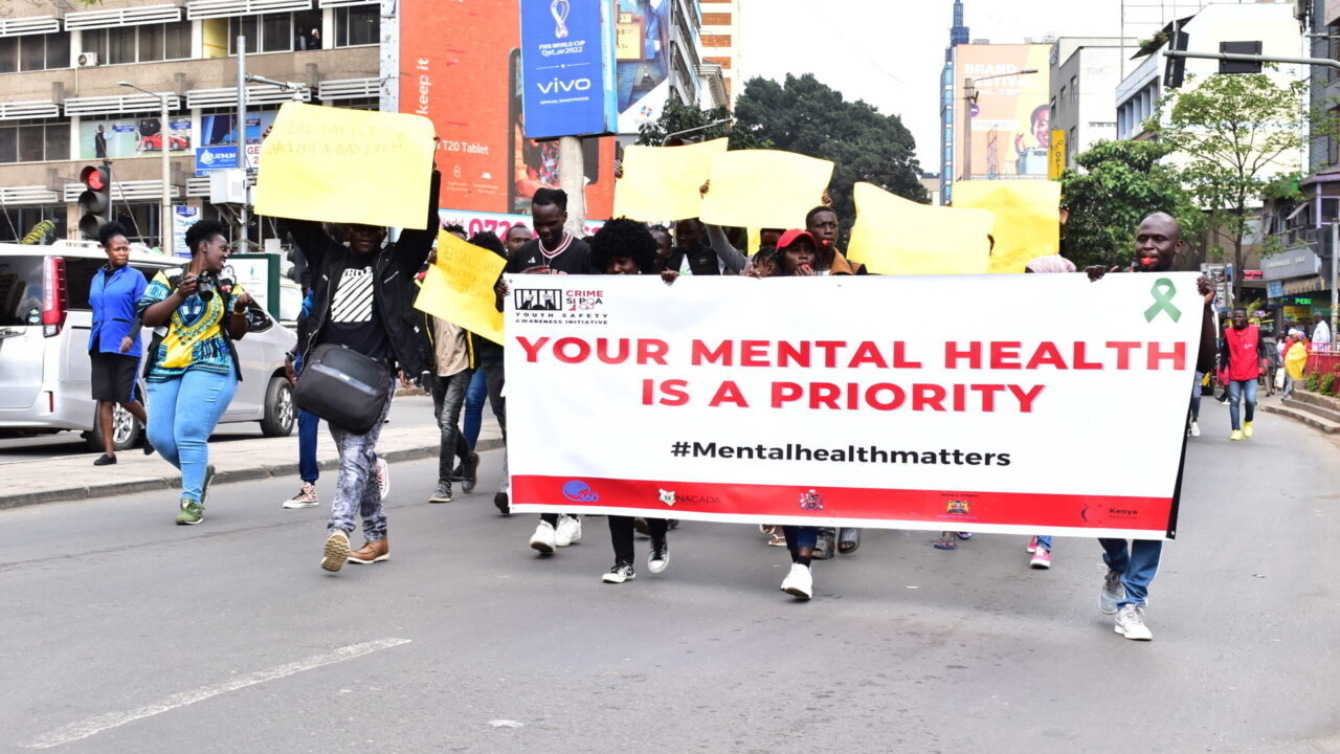
By Calvince Otieno
One notable outcome of the COVID-19 era is the demystification of mental health. Gone are the days mental health was labelled a “generational curse” only discussed in hushed tones and which required special exorcism. The era of locking up patients in dark rooms and feeding them through doors like caged animals is also gone.
These strides gained in the fight against the stigma associated with mental health, were widely acknowledged during the commemoration of World Mental Health Day forum organised by Crime Si Poa in partnership with Sarakasi Trust, Mental 360, NACADA, Kenya Red Cross, and varsity students among other stakeholders at the Sarakasi Dome, in Ngara, Nairobi.
The forum, preceded by mental health awareness walk in Nairobi, aimed at amplifying the voice of young people, on mental health challenges they are facing, possible remedies and avenues of available support.
Marking the international day themed “Making Mental Health a Global Priority,” Jacob Onyango from NACADA highlighted the adverse effects of drugs and substance abuse on mental health among the youth.
“Issues of drug abuse are also issues of mental health. Drug abuse reduces psychological resistance, making it easier for individuals to give in to suicidal thoughts’’ said Onyango.
He encouraged young people to keep off drugs, noting that treating addiction is a costly and long drawn process. Onyango further called for increased psycho-social interventions, including establishment of more mental health facilities, to deal with the rising cases of mental health issues in Kenya
Touching on mental health challenges facing varsity students including acute depression, occasioned by external stressors, Marcelyn Joel a student leader from JKUAT, stressed on the need for young people to take advantage of available psycho-social support services offered in learning institutions and like-minded organizations instead of taking extreme measures like suicide.
“Many students have difficulties in their academic journey. Though issues like poverty are family related, others like poor academic performance, peer and social media pressure, alcoholism, and drug abuse, are some of the stressors that affect their mental status negatively,” Marcelyn said.
Mental 360 CEO, Bright Shitemi, mentioned that although mental illness is more pronounced today than ever before due to the increased awareness of mental health issues as well as the increased pressures in life as our society progresses, more must be done.
Kenya is said to be lagging in awareness and treatment of mental health illnesses. Hence an increase in resources and awareness campaigns to build up support systems in the society is needed.
“Psychological support needs to be accompanied by economic empowerment. Most people dealing with mental issues also have economic challenges that inhibit them from accessing help contributing to the vicious cycle,” he said.
During the forum stakeholders urged the government to incorporate young people as well as survivors of mental health illnesses while developing policies that advocate for mental health. This is said to be a key demographic mostly ignored by the Ministry of Health Taskforce.
Martha Lee a consultant counselling psychologist from Crime Si Poa echoed sentiments from other speakers, adding that there was an urgent need for a holistic dimension in tackling mental health.
“1 out of 5 people experience mental health issues, depression and anxiety being the most common. We need to create more spaces for people dealing with mental issues,” lamented Martha, adding, “Positive associations in the environment such as a family keepsake, photos, or familiar objects can boost mood and a sense of connection.”
She urged people to seek counselling as therapy can be beneficial for both the individual with mental illness as well as the other family members.
Crime Si Poa has since COVID-19 prioritized mental wellness as a core operational and programmatic issue with a fully-fledged wellness unit. The organization has also cascaded the same to all our activities in prisons, schools, and communities by creating awareness through psychoeducation and offering psychosocial counselling to the affected.

